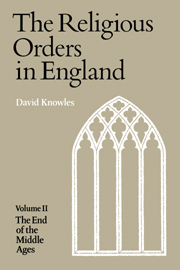Book contents
- Frontmatter
- Contents
- Preface
- List of Abbreviations
- Part One The Historical Framework
- Chap. I The opening of the period
- Chap. II Monks and canons at the university, 130c–1450
- Chap. III Patrons and architects: Ely and Gloucester
- Chap. IV Portraits of monks
- Chap. V Monks and friars in controversy
- Chap. VI Trends in speculation: Ockhamism, justification and grace
- Chap. VII Criticism of the religious in the fourteenth century
- Chap. VIII The spiritual life of the fourteenth century
- Chap. IX Developments within the orders: I
- Chap. X Developments within the orders: II
- Chap. XI The fortunes of the Cluniac houses and the alien priories
- Chap. XII The loosening of discipline
- Chap. XIII King Henry V
- Chap. XIV More portraits of monks
- Chap. XV The second century of visitation, 1350–1450
- Chap. XVI The spiritual life of the fifteenth century
- Part Two The Institutional Background
- Appendix I Chaucer's monk
- Appendix II Henry V and the Westminster recluse
- Appendix III Regulars as bishops
- Bibliography
- Index
Chap. XII - The loosening of discipline
Published online by Cambridge University Press: 28 January 2010
- Frontmatter
- Contents
- Preface
- List of Abbreviations
- Part One The Historical Framework
- Chap. I The opening of the period
- Chap. II Monks and canons at the university, 130c–1450
- Chap. III Patrons and architects: Ely and Gloucester
- Chap. IV Portraits of monks
- Chap. V Monks and friars in controversy
- Chap. VI Trends in speculation: Ockhamism, justification and grace
- Chap. VII Criticism of the religious in the fourteenth century
- Chap. VIII The spiritual life of the fourteenth century
- Chap. IX Developments within the orders: I
- Chap. X Developments within the orders: II
- Chap. XI The fortunes of the Cluniac houses and the alien priories
- Chap. XII The loosening of discipline
- Chap. XIII King Henry V
- Chap. XIV More portraits of monks
- Chap. XV The second century of visitation, 1350–1450
- Chap. XVI The spiritual life of the fifteenth century
- Part Two The Institutional Background
- Appendix I Chaucer's monk
- Appendix II Henry V and the Westminster recluse
- Appendix III Regulars as bishops
- Bibliography
- Index
Summary
THE GREAT SCHISM
The Great Schism of 1378–1409 inevitably affected all those religious who were dependent upon mother-houses situated in the dominions of the French king, or who belonged to international orders. News of the election of Urban VI, the first Italian pope for a lifetime, was received enthusiastically in England, and when reports of the controversy and schism arrived they were too late to cause a transfer of allegiance, which in any case would not readily have been given to a Frenchman. The severance of relations with all who acknowledged Clement VII, however, entailed serious consequences in many quarters.
Among the black monks those of the family of Cluny were seriously affected; the monks made profession to the abbot of Cluny; the priors attended chapter either at Cluny or their immediate French mother-house; and priors were appointed from overseas. This machinery was now thrown out of gear even more seriously than during the periods of active war with France. A bull of Urban VI ordered the priors of Thetford and Bermondsey to hold a general chapter of all those who usually went to Cluny, wherein they might elect two monks with all the powers of the abbot and general chapter of Cluny. This proposed scheme of government met with opposition when the chapter assembled, for three of the four priors of the direct foundations of Cluny—Lewes, Montacute and Lenton—maintained that they, together with the fourth, the prior of Thetford, should have replaced the general chapter.
- Type
- Chapter
- Information
- Religious Orders Vol 2 , pp. 167 - 174Publisher: Cambridge University PressPrint publication year: 1979



